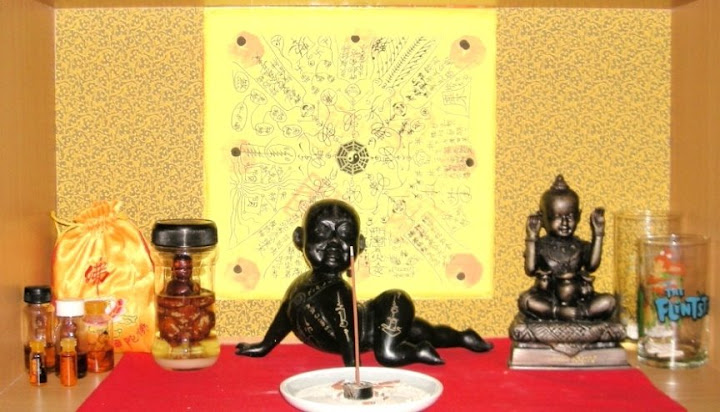1. Does this talisman have to be in my altar room at all times to ensure the deities' presence? If it is removed, does it mean the deities are no longer in my house?
Answer: Yes, the 'Protection All In One' Talisman need to be on the altar or at the altar room at all time to ensure the deities presence. Once removed, deities will no longer there. Because your deity statues are not consecrated. This talisman is the main 'spiritual power' source to activate the altar, especially for the westerners who bought Taoist / Buddhist Deity Statues, not knowing that statues need to go through 'spiritual activation' ritual (开光 - Kai Guang).
Related Article:
- Activate Your Taoist Altar with "36 Heavenly Warriors" Talisman
- Consecration Of Taoist Deity Statues
Take Note: 'Protection All In One' Talisman can also be folded and kept inside wallet / purse to be carried around wherever You go. When You want to pray to it, You can put the talisman (being folded is ok) onto a tray and light up incense and pray to it. Without Deity Statues at home, the 'Protection All In One' Talisman alone can be 'stand alone' on the altar to be prayed to.
Related Article:
- How an Average American Guy end up choosing the Taoist Magical Path (and how You can pray like him)
Answer: When you are praying at the altar to seek protection, deities will hear you and protect you whereever you go. Just like how you go to a temple to pray and still be blessed by the deities when you are away from temple.
3. What happens if the talisman is misplaced, lost or stolen?
Answer: Nothing will happen, you just lost the protection, but the person who steal the talisman will face punishment by the deities.
Related Website / Blog: talisman-4-u.blogspot.com
4. Is it correct to say that joss sticks or incense has to be burnt in order to communicate with either deities or ghosts? May I also use resin incense?
Answer: Yes, joss sticks, aroma cones, or resin incense (Example: Kemenyan (Benzoin)) is Ok. In Taoist Practice, lighting up Joss Sticks is a must when communicating with the deities and also a form of respect. Even spiritual masters, black magic practitioners of other faiths also need to use incense or prayer materials to produce smoke when performing ritual.
Related Article: Why Taoists need and must burn Joss Sticks and Joss Papers? AND WHY SHOULD YOU?
5. I travel constantly for work and cannot burn joss sticks in my hotel rooms. How then do I communicate with the deities or ghost companions?
Answer: When You cannot light up joss sticks, just hold onto the talisman on Your palm in prayer manner and pray to it. The deities or ghosts will understand.
6. May I burn Joss papers to honour the deities, and hell notes as offerings to my spirit companions to show my extreme gratitude? I would like to do that everyday at home. Are there any protocols or procedures I should follow in the process of doing so?
Answer: You can burn joss papers to honour the deities . If You are doing it inside a room, 1 piece or few pieces in odd numbers will do. You don't have to burn joss papers everyday. You can do it on every 1st and 15th of Chinese Lunar Month, important days (spiritual manifestation day / birthday / enlightenment day) of the particular deities You are praying to, and during Traditional Chinese Festivals . All in all, it is still up to You.
7. Is there any conflict in having two talismans (Protection All In One Talisman & 5 Ghosts Multi-Purpose Talisman) for life? I am after all, seeking help from both gods and ghosts at the same time; asking for the very same things you mentioned that are important in life; namely safety, health and peace.
Answer: There is no conflict in praying to the Protection All In One Talisman & 5 Ghosts Multi-Purpose Talisman together.
Related Article: Ultimate 5 Ghosts Multi-Purpose Talisman
8. My job needs me to always on the move and travel around. I am very vulnerable to all sorts of spiritual attacks, accidents and mishaps. There are many unclean and unpleasant spirits residing in the hotels rooms that I stay in at the end of the day. I plan on not framing my protection talisman and hanging it in my altar room, until my luck improves. Do you have any advise or suggestions?
Answer: You can fold the talismans nicely and keep inside Your wallet, purse, pouch or bag and carry along wherever You go. When You are travelling, example:in Your hotel room or any places that You are inconvenient to light up incense sticks to pray, just hold the talisman and put in between both palms in prayer manner and pray to it. When You return home, You can put them on a tray or a box, then light up incense stick and pray to it.
Related Article: Check out how an American guy set up his Taoist Altar and pray to the 'Protection All in one' Talisman >> How an Average American Guy end up choosing the Taoist Magical Path





